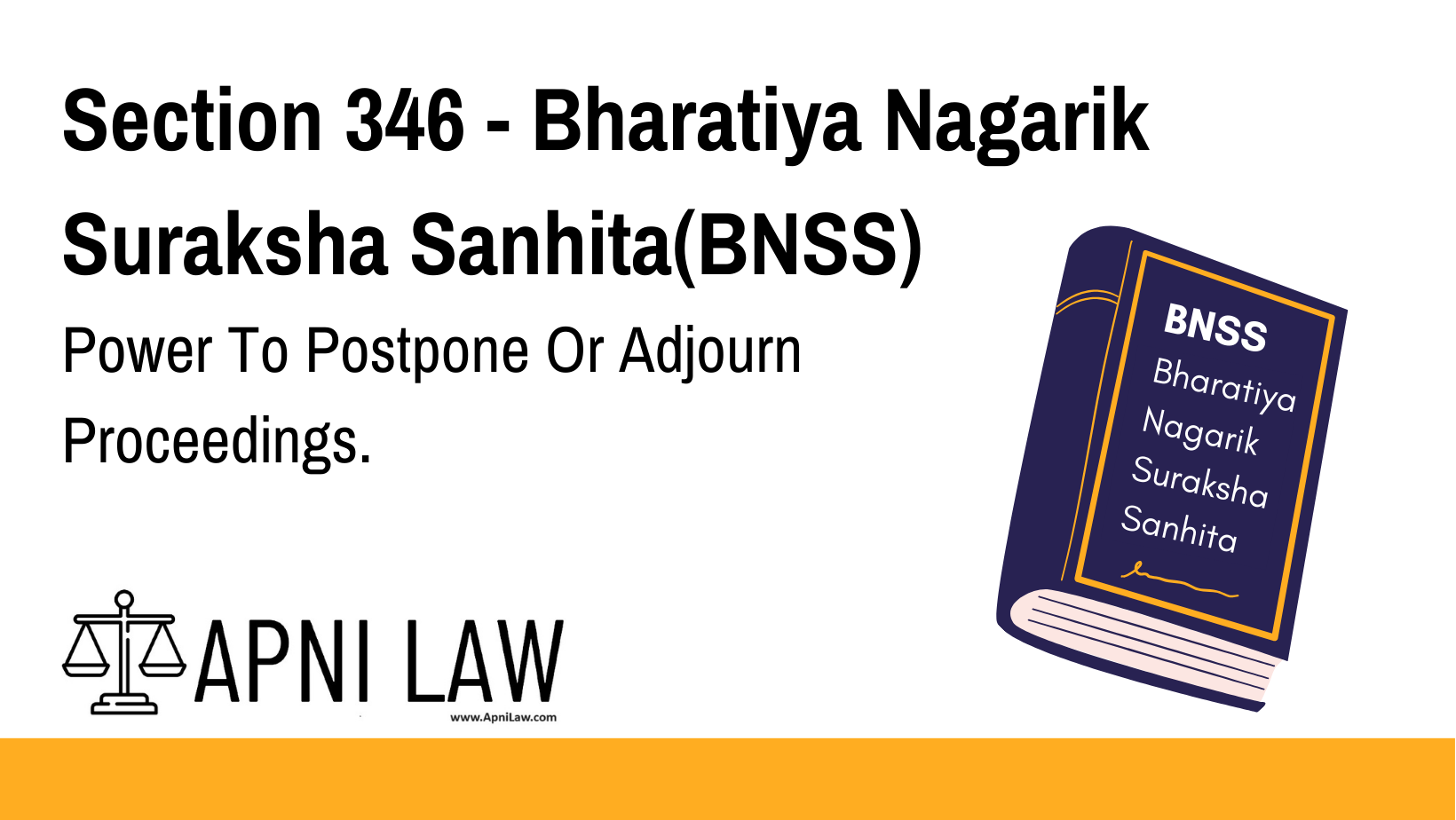Code: Section 346 BNSS
346.
(1) In every inquiry or trial, the proceedings shall be continued on a day-to-day basis until all the witnesses in attendance have been examined, unless the Court finds adjournment beyond the following day necessary, for reasons to be recorded:
Provided that when the inquiry or trial relates to an offence under Section 64, Section 66, Section 67, Section 68, and Section 70 of the Bharatiya Nyaya Sanhita, 2023, the inquiry or trial shall be completed within a period of two months from the date of filing of the chargesheet.
(2) If the Court, after taking cognizance of an offence, or commencement of trial, finds it necessary or advisable to postpone or adjourn any inquiry or trial, it may do so, for reasons to be recorded, and may remand the accused if in custody.
Provided that no Court shall remand an accused person to custody for a term exceeding fifteen days at a time.
Provided further that when witnesses are in attendance, no adjournment shall be granted without examining them, except for special reasons recorded in writing.
Provided also that no adjournment shall be granted solely to enable the accused to show cause against the sentence proposed to be imposed on him.
Further, the following conditions apply to adjournments:
(a) No adjournment shall be granted at the request of a party, except where circumstances are beyond the party’s control.
(b) If circumstances are beyond control, the Court may grant only two adjournments, after hearing objections from the other party and recording reasons in writing.
(c) The fact that an advocate is engaged in another Court shall not be a ground for adjournment.
(d) If a witness is present in Court but a party or its advocate is absent or unprepared, the Court may record the witness’s statement and proceed with orders as necessary.
Explanation 1: If sufficient evidence raises suspicion that the accused may have committed an offence, and further evidence may be obtained through remand, this is a reasonable cause for remand.
Explanation 2: The terms on which an adjournment or postponement may be granted may include, in appropriate cases, payment of costs by the prosecution or accused.
Explanation of Section 346 BNSS
Section 346 ensures that trials and inquiries are conducted without unnecessary delays, maintaining judicial efficiency and timely justice. The provision strictly regulates adjournments and remands, ensuring that cases do not get delayed due to frivolous reasons.
Key Provisions of Section 346 BNSS
- Day-to-Day Proceedings:
- Trials should proceed daily until all witnesses present have been examined.
- Adjournments must be justified with recorded reasons.
- Special Fast-Track Cases (Section 64, 66, 67, 68, and 70 BNSS):
- If the trial concerns serious offenses, it must be completed within two months of filing the chargesheet.
- Rules for Adjournments:
- Adjournments are only allowed for valid reasons.
- The accused cannot be remanded for more than 15 days at a time.
- If witnesses are present, the Court must examine them before granting an adjournment.
- No adjournment is allowed only to help the accused prepare for sentencing.
- Restrictions on Adjournments:
- No adjournment simply because an advocate is engaged elsewhere.
- A maximum of two adjournments can be granted for reasons beyond control.
- If a witness is present but the party’s lawyer is absent or unprepared, the Court can record the witness’s statement and proceed.
- Remand and Additional Evidence:
- If more evidence is likely to be discovered, the accused can be remanded for further investigation.
- Adjournments may require the accused or prosecution to bear costs.
This provision ensures that justice is not delayed due to procedural inefficiencies, maintaining fairness for all parties.
Illustration
Example 1: Delayed Witness Examination in a Theft Case
A trial for theft is ongoing. The prosecution’s witnesses are present in Court, but the defense lawyer is engaged in another case.
- The Judge refuses an adjournment because the lawyer’s engagement elsewhere is not a valid reason.
- The Court records the witnesses’ statements and proceeds with the case.
Example 2: Two-Month Limit for Serious Offenses
A person is accused of human trafficking (Section 67 BNSS). The chargesheet is filed on March 1, 2024.
- The trial must conclude by May 1, 2024 (within two months).
- The Court cannot delay the proceedings beyond this period unless there are extraordinary circumstances.
Example 3: Remand for Additional Evidence
A judge finds that the police have partial evidence linking an accused to a financial fraud case. The investigating officer requests additional time to obtain bank records.
- The Judge grants a 15-day remand under Explanation 1, as more evidence is likely to be obtained.
Common Questions and Answers on Section 346 BNSS
1. Can a trial be adjourned if the defense lawyer is busy in another Court?
No. The engagement of an advocate in another Court is not a valid ground for adjournment.
2. What happens if a trial is for an offense under Sections 64, 66, 67, 68, or 70 BNSS?
The trial must be completed within two months from the date the chargesheet is filed.
3. How long can a Court remand an accused in custody at one time?
A maximum of 15 days at a time.
4. Can a Court grant adjournments for witness examination?
No, unless there are special reasons recorded in writing. If a witness is present, they must be examined before granting an adjournment.
5. Can an accused request adjournment to prepare for sentencing arguments?
No. Adjournments cannot be granted just to allow the accused to show cause against sentencing.
Conclusion
Section 346 BNSS ensures that trials proceed without unnecessary delays, making adjournments the exception rather than the rule. By enforcing strict time limits and preventing frivolous adjournments, this provision strengthens the efficiency of the judicial system and upholds timely justice.
For more legal insights, visit ApniLaw! 🚀








